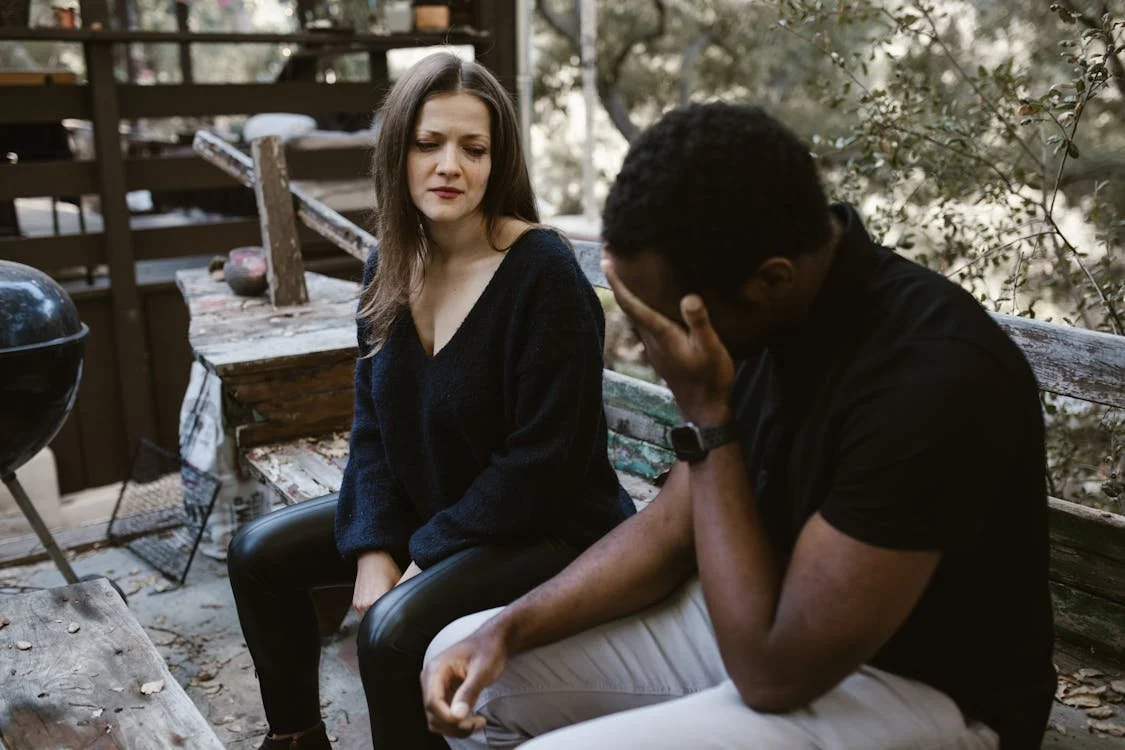Why Past Trauma Might Be Hurting Your Current Relationship
How does trauma affect relationships? It’s a question many people don’t think about until they notice patterns that keep showing up with their partners. You might find yourself pulling away when someone gets too close, feeling an intense fear of rejection during small disagreements, or struggling to trust even when your partner has done nothing wrong. These patterns can feel confusing, but often, they are the echoes of past trauma.
Trauma isn’t always the result of one dramatic event. It can come from childhood neglect, growing up around conflict, surviving abuse, experiencing loss, or even years of constant stress. The impact doesn’t disappear just because time passes. Instead, unresolved trauma can carry into adulthood, quietly shaping how we connect, communicate, and feel safe in relationships.
For many, this shows up as difficulty with intimacy, cycles of conflict, or emotional triggers that don’t seem to match the situation. The good news is that while trauma can create barriers, it doesn’t have to keep you from building healthy, fulfilling relationships. With awareness, compassion, and the right support, it is possible to heal and break free from negative patterns.
In this guide, we’ll look at what emotional trauma is, how it affects relationships, signs to watch for, and how therapy, including trauma therapy and couples therapy, can help. Understanding the connection between trauma and relationships is the first step toward building stronger, more supportive bonds.
What Is Emotional Trauma?
Emotional trauma is the deep psychological impact that comes from experiencing events that are overwhelming, frightening, or harmful. Unlike everyday stress, trauma leaves a lasting imprint on the way a person thinks, feels, and interacts with the world. It can be the result of a single event, such as an accident or sudden loss, or it can stem from ongoing experiences, like childhood neglect, abuse, or years of constant conflict.
When the brain and body are exposed to trauma, the nervous system often shifts into survival mode. While this response may protect someone in the moment, it can also create long-term changes in how they process emotions and relate to others. Unresolved past trauma may lead to anxiety, hypervigilance, emotional numbness, or difficulty trusting people.
Common sources of emotional trauma include:
Childhood abuse or neglect
Domestic violence or toxic relationships
Loss of a loved one
Natural disasters or serious accidents
Chronic stress from unsafe environments
The effects of trauma don’t always fade with time. Instead, they can resurface in adulthood, especially within relationships where closeness and vulnerability are involved. This is because relationships often trigger the same parts of the brain that were activated during the original trauma.
Understanding what emotional trauma is and how it differs from temporary stress is the first step toward healing. It helps explain why certain reactions may feel “bigger” than the situation at hand and why supportive environments, including trauma therapy, are so essential for recovery.
How Does Trauma Affect Relationships?
When unresolved trauma is carried into adulthood, it often shows up most clearly in close relationships. Romantic partnerships, friendships, and even family connections can become places where old wounds resurface. This isn’t because the relationship itself is unhealthy, but because intimacy, trust, and vulnerability can stir up echoes of past trauma.
Difficulty with trust. People who have experienced trauma may find it hard to fully trust others, even when their partner is dependable and supportive. This can lead to suspicion, doubt, or needing constant reassurance.
Fear of abandonment. Trauma, especially from childhood, can create deep fears of being rejected or left behind. Small disagreements or periods of distance may trigger outsized feelings of panic or insecurity.
Emotional withdrawal or defensiveness. Some trauma survivors cope by pulling away when they feel overwhelmed. Others may become defensive, expecting criticism or betrayal even when none is intended.
Impact on intimacy. Trauma can affect both emotional and physical closeness. A person may crave intimacy but struggle to feel safe, leading to cycles of closeness and distance that confuse both partners.
Patterns of conflict. Because trauma alters the nervous system, even minor stressors can spark intense reactions. Arguments may escalate quickly, or one partner may shut down entirely, making healthy communication difficult.
These challenges don’t mean the relationship is doomed. Instead, they highlight how powerful the effects of trauma can be and why awareness and support are so important. Recognizing how trauma influences behavior is the first step toward healing, both individually and together. With time, compassion, and tools like couples therapy and trauma therapy, it’s possible to break free from these cycles and build stronger, healthier bonds.
Signs Trauma May Be Showing Up in Your Relationship
Sometimes it’s not obvious that past trauma is influencing a current relationship. Many people don’t connect the dots between what they went through years ago and how they act with their partner today. Yet trauma often leaves patterns that quietly shape the way we relate to those closest to us.
Here are some signs trauma may be showing up in your relationship:
1. Emotional Triggers During Conflict
Arguments may bring out intense fear, anger, or sadness that feels bigger than the situation itself. This can happen because the disagreement echoes earlier experiences of conflict or rejection.
2. Overreactions To Small Issues
For someone carrying trauma, even minor problems, a late text, or a canceled plan can feel like a major threat, sparking strong emotional responses.
3. Difficulty Communicating Needs
Trauma survivors sometimes struggle to express what they want or need in relationships. Instead, they may withdraw, lash out, or hope their partner will “just know.”
4. Feeling Unsafe, Even In Safe Situations
Even when a partner is supportive, someone with trauma may still feel uneasy or on guard, as if waiting for something to go wrong.
5. Repeating Unhealthy Patterns
Trauma can create cycles where the same kinds of conflicts or relationship dynamics repeat, even with different partners.
These signs don’t mean you’re broken or incapable of love. They mean your nervous system and emotions are still carrying the weight of emotional trauma. Recognizing these patterns is empowering; it allows you to seek support, set healthier boundaries, and begin the healing process so your relationships can thrive.
The Role of Childhood Trauma in Adult Relationships
The experiences we have in childhood shape the way we view ourselves, others, and the world. When those experiences include childhood trauma, the effects often extend into adulthood and show up most clearly in relationships.
One of the main ways this happens is through attachment styles. These are patterns of relating that develop based on how safe and supported we felt growing up. For example:
Anxious attachment. If a child experienced neglect, inconsistency, or abandonment, they may grow into adults who fear rejection and crave constant reassurance from partners.
Avoidant attachment. Children who learned early on that their needs wouldn’t be met may become adults who avoid closeness altogether, preferring independence over vulnerability.
Disorganized attachment. When childhood included both fear and love from caregivers, it can create a confusing push-pull dynamic in adult relationships.
These patterns often play out in subtle but powerful ways. Someone with anxious attachment may text constantly, worried their partner will leave. Someone avoidant may shut down during conflict, leaving their partner feeling shut out. Both responses stem from past trauma, not from the current partner’s actions.
Childhood trauma can also affect how safe intimacy feels. A person may long for connection but feel overwhelmed once they have it. They may expect rejection, even in supportive relationships, because their early experiences taught them love wasn’t secure.
The good news is that these patterns are not permanent. With awareness and support from trauma therapy or couples therapy, people can heal attachment wounds, learn healthier ways of relating, and build relationships that feel safe and stable.
Breaking Negative Patterns With Therapy
When trauma shapes the way we connect with others, it can feel like the same struggles keep showing up again and again. Arguments escalate, trust feels fragile, and intimacy can seem out of reach. The good news is that these patterns don’t have to define your relationships. With the right support, they can be understood, worked through, and changed.
Trauma therapy helps individuals explore the root causes of their reactions. A trauma therapist provides a safe, nonjudgmental space to process painful experiences and understand how those experiences are influencing present-day behavior. By making these connections, people gain clarity, realizing that their strong reactions aren’t about their current partner but about unresolved past trauma.
Therapy also teaches practical tools for managing emotions and triggers. Techniques like grounding exercises, deep breathing, and mindfulness help regulate the nervous system when conflict arises. Over time, these tools make it easier to respond thoughtfully instead of reacting automatically.
For couples, couples therapy can be especially powerful. With professional guidance, partners learn how to communicate more clearly, recognize each other’s triggers, and build healthier ways of resolving conflict. Instead of falling into old cycles, couples can create new patterns based on trust, empathy, and respect.
Healing through therapy doesn’t erase the past, but it allows you to loosen its grip on the present. The goal is not perfection, but progress, moving from relationships shaped by trauma to ones grounded in safety, understanding, and love.
Why Choose Wellman Psychology for Trauma Therapy in Chicago
If you’ve noticed the effects of past trauma in your relationships, whether through conflict, fear of abandonment, or difficulty with trus,t you don’t have to face it alone. Professional support can help you understand these patterns and replace them with healthier, more fulfilling ways of connecting. That’s where Wellman Psychology can make a difference.
At Wellman Psychology, the focus is on helping clients heal from trauma in a compassionate and structured way. Therapists here are trained in evidence-based approaches like CBT, EMDR, and somatic therapy, which are proven to reduce the emotional weight of trauma and help people build new skills for resilience.
For couples, specialized couples therapy provides a safe space to work through challenges together. Partners learn how to support each other, recognize triggers, and strengthen their bond through trust and understanding.
What sets Wellman Psychology apart is the personalized approach. No two people’s experiences with trauma are the same, so treatment plans are tailored to each client’s unique history and goals. From the first session, the priority is creating a safe environment where you can share openly and begin to heal.
If you’re ready to break free from the grip of past trauma and build stronger, healthier relationships, reach out to Wellman Psychology’s Trauma Therapy Chicago IL, today. With the right support, you can move forward with confidence and peace.
Final Thoughts
So, how does trauma affect relationships? It can show up in many ways, from difficulty trusting to fear of abandonment, emotional withdrawal, or recurring conflict. These patterns are not a reflection of weakness or failure, but the natural result of carrying unresolved emotional trauma into adult relationships.
The important truth is this: while trauma can shape how we connect, it doesn’t have to define our future. By recognizing the signs, understanding the role of childhood experiences, and seeking support, it’s possible to break free from negative cycles. Relationships can become spaces of healing rather than places where old wounds are repeated.
Trauma therapy and couples therapy offer powerful tools for change. With professional guidance, you can reframe beliefs, learn emotional regulation, and create healthier ways of relating. Healing is not about erasing the past; it’s about loosening its hold so you can build stronger, safer, and more fulfilling relationships today.
Feel free to check out our social media links below:
Find out more articles that can help you below:
What Causes Trauma in Childhood
How Does Teenage Trauma Affect Adulthood









